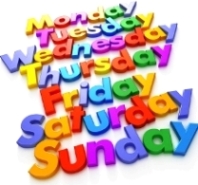Better Time Management For Kids

Better time management for kids is always possible, no matter what age they are.
All too soon, fun, school and chores become work, choices and responsibilities, so teach your children how to use and apply simple time management skills and tools - you’ll reap the rewards for many years.
Sure, kids learn to tell the time; but what does that actually mean?
Simply that they know how to break days down into hours, minutes and seconds. But telling the time is one thing; linking it to activities is another.
As adults we have learnt to associate tasks with time. Children who learn this too will be better equipped to cope with the way people structure life.
In other words, eventually kids need to learn that there is always a finite amount of time. For example, they only have so long between waking up and going to school, or ending school and going to bed.
Do they know why it matters? Are they clear on the consequences, costs and benefits of their time management?
As adults, it’s our responsibility to make sure children understand and expect these. When they do, they’ll internalize habits faster and better… which benefits everyone.
Tools to use
Time management chart
Regardless of age, everybody benefits from being able to map out their days and weeks. It’s a simple and effective way to show improves time management for kids' routines, rhythms and limits during their days and weeks.
Analogue and digital clocks
When they’re young, teach them to make the link between time and activities. Using the earlier example, how much time is there between waking up and going to school? What needs to be done? How much time will it take?
Sit down together so they understand, and then involve them in planning out a routine. This naturally leads on to useful techniques such as time boxing.
Timer
A simple kitchen timer is a great way to quickly improve time management for children. Use it to put limits on any activity you can think of. Whether it is for TV time, a ‘ten minute tidy’ or any other time box activity, introduce it and link it to the benefits it brings them.
When they use it themselves without any apparent supervision, you’ve nailed it! Visual timers are particularly useful.
Daily planner
When they are young, your weekly planner will help you map out their activities. As they grow older, encourage them to purchase and use their own daily planner so they can increasingly plan, remind and manage themselves.
Purchasing it with their own money will boost their perception of its value.
Skills to learn
This website has many time management activities but to start with, focus on, then help them learn how to…
Read these articles, then teach them yourself. This is really where time management for kids comes into it's own.
Making time - the most effective way
Helping kids to manage time takes time. The ideas, tips and tools here will all help; but the best effect is to plan when to do this and then actually do it.
Teaching isn’t enough -- plenty of kids are taught without learning. Make time to teach so they learn and understand the importance of time management. Explain so they understand.
Theory is one thing, but practice is another. Yes, kids learn if they’re taught patiently, but they’ll model their time management on the way you apply yours.
Set an example that you want them to imitate in their own lives.
- Home
- More Articles...
- Time Management for Kids

